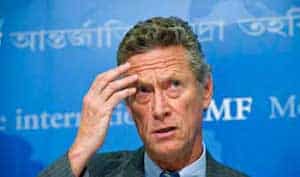Global
By Gordon Platt
 |
|
Blanchard: Policymakers should use all the tools available |
Economists who thought they had figured out how to keep national economies growing and inflation under control by simply focusing on short-term interest rates have learned some important lessons from the recent recession. Olivier Blanchard, economic counselor of the International Monetary Fund and head of its research department, is one economist who has done some rethinking.
One clear lesson of the crisis is that fiscal policy can no longer play a secondary role to monetary policy, Blanchard argues in an IMF staff position note issued last month. The paper was co-authored by Giovanni Dell’Ariccia and Paolo Mauro. Blanchard, who joined the IMF in 2008 from the Massachusetts Institute of Technology, says economists and policymakers alike were lulled into a false sense of security before the crisis. While policymakers still have to keep an eye on inflation and output, they have to watch many other variables, such as leverage and the behavior of asset prices, he says. They also have to make greater use of the instruments at their disposal, including margin, capital ratios and loan-to-value ratios.
If monetary policy and regulatory tools are to be used in combination, the easiest way to coordinate them could be to put central banks in charge of both. “Indeed, the trend toward separation of the two may well have to be reversed,” Blanchard says in an interview with IMF Survey online. The crisis has shown that large shocks to the system can and do happen, he points out. “Maybe policymakers should therefore aim for a higher target inflation rate in normal times in order to increase the room for monetary policy to react to such shocks,” he says.
Similarly, fiscal policy should be changed to allow more room to maneuver during times of trouble, Blanchard says. Emerging markets that entered the crisis with lower levels of debt were able to use fiscal policy more aggressively. His remarks not only seem sensible, but they are timely, as the sovereign risk crisis in Europe flares up.



